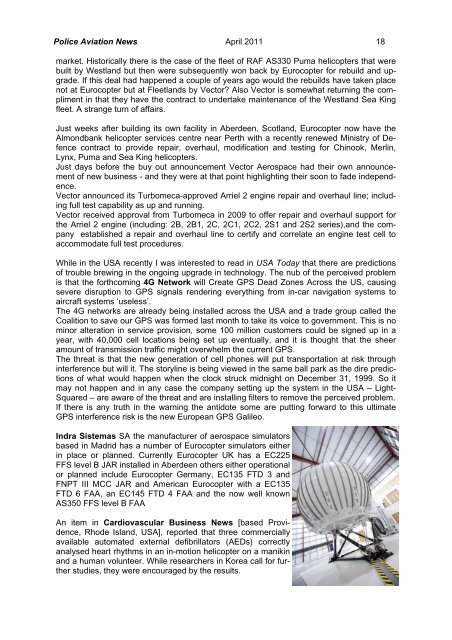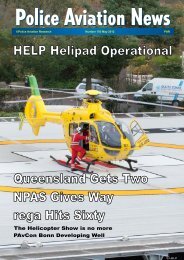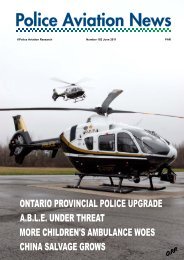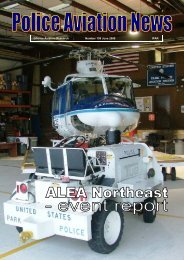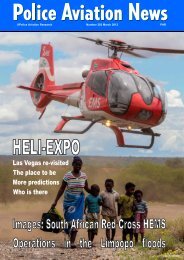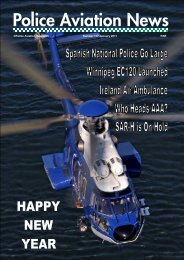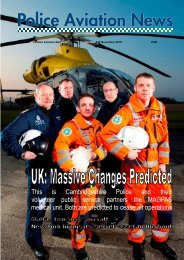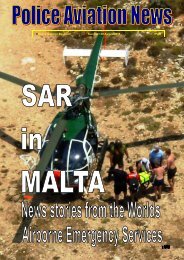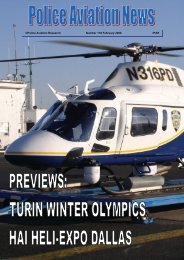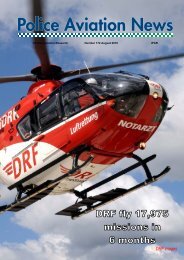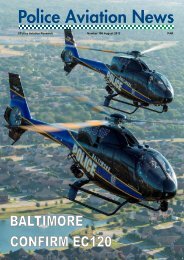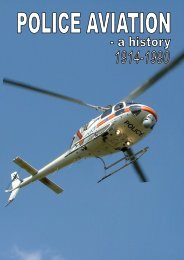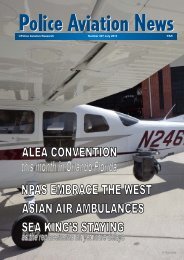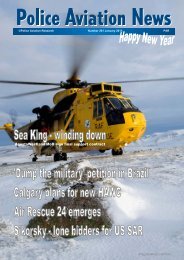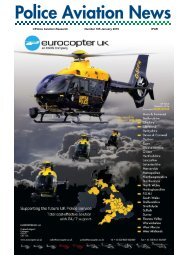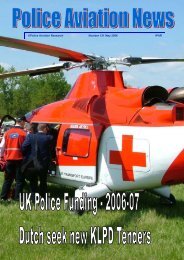Police Aviation News April 2011
Police Aviation News April 2011
Police Aviation News April 2011
Create successful ePaper yourself
Turn your PDF publications into a flip-book with our unique Google optimized e-Paper software.
<strong>Police</strong> <strong>Aviation</strong> <strong>News</strong> <strong>April</strong> <strong>2011</strong> 18<br />
market. Historically there is the case of the fleet of RAF AS330 Puma helicopters that were<br />
built by Westland but then were subsequently won back by Eurocopter for rebuild and upgrade.<br />
If this deal had happened a couple of years ago would the rebuilds have taken place<br />
not at Eurocopter but at Fleetlands by Vector? Also Vector is somewhat returning the compliment<br />
in that they have the contract to undertake maintenance of the Westland Sea King<br />
fleet. A strange turn of affairs.<br />
Just weeks after building its own facility in Aberdeen, Scotland, Eurocopter now have the<br />
Almondbank helicopter services centre near Perth with a recently renewed Ministry of Defence<br />
contract to provide repair, overhaul, modification and testing for Chinook, Merlin,<br />
Lynx, Puma and Sea King helicopters.<br />
Just days before the buy out announcement Vector Aerospace had their own announcement<br />
of new business - and they were at that point highlighting their soon to fade independence.<br />
Vector announced its Turbomeca-approved Arriel 2 engine repair and overhaul line; including<br />
full test capability as up and running.<br />
Vector received approval from Turbomeca in 2009 to offer repair and overhaul support for<br />
the Arriel 2 engine (including: 2B, 2B1, 2C, 2C1, 2C2, 2S1 and 2S2 series),and the company<br />
established a repair and overhaul line to certify and correlate an engine test cell to<br />
accommodate full test procedures.<br />
While in the USA recently I was interested to read in USA Today that there are predictions<br />
of trouble brewing in the ongoing upgrade in technology. The nub of the perceived problem<br />
is that the forthcoming 4G Network will Create GPS Dead Zones Across the US, causing<br />
severe disruption to GPS signals rendering everything from in-car navigation systems to<br />
aircraft systems ‘useless’.<br />
The 4G networks are already being installed across the USA and a trade group called the<br />
Coalition to save our GPS was formed last month to take its voice to government. This is no<br />
minor alteration in service provision, some 100 million customers could be signed up in a<br />
year, with 40,000 cell locations being set up eventually, and it is thought that the sheer<br />
amount of transmission traffic might overwhelm the current GPS.<br />
The threat is that the new generation of cell phones will put transportation at risk through<br />
interference but will it. The storyline is being viewed in the same ball park as the dire predictions<br />
of what would happen when the clock struck midnight on December 31, 1999. So it<br />
may not happen and in any case the company setting up the system in the USA – Light-<br />
Squared – are aware of the threat and are installing filters to remove the perceived problem.<br />
If there is any truth in the warning the antidote some are putting forward to this ultimate<br />
GPS interference risk is the new European GPS Galileo.<br />
Indra Sistemas SA the manufacturer of aerospace simulators<br />
based in Madrid has a number of Eurocopter simulators either<br />
in place or planned. Currently Eurocopter UK has a EC225<br />
FFS level B JAR installed in Aberdeen others either operational<br />
or planned include Eurocopter Germany, EC135 FTD 3 and<br />
FNPT III MCC JAR and American Eurocopter with a EC135<br />
FTD 6 FAA, an EC145 FTD 4 FAA and the now well known<br />
AS350 FFS level B FAA<br />
An item in Cardiovascular Business <strong>News</strong> [based Providence,<br />
Rhode Island, USA], reported that three commercially<br />
available automated external defibrillators (AEDs) correctly<br />
analysed heart rhythms in an in-motion helicopter on a manikin<br />
and a human volunteer. While researchers in Korea call for further<br />
studies, they were encouraged by the results.


